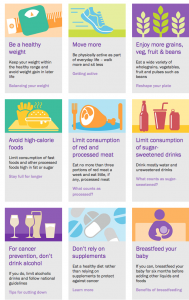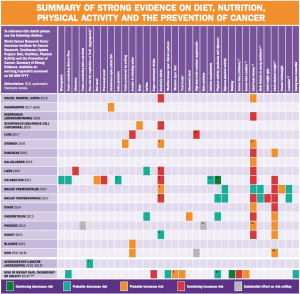Many people are unaware that many cancers are preventable and the contribution changes to your lifestyle can contribute to reducing risks for you and your family members.
In fact WCRF estimates that around 40% of cancer cases are preventable. Eating a healthy diet, being more active each day and maintaining a healthy weight are, after not smoking, the most important ways you can reduce your cancer risk.
The evidence for these finding are summarised in a landmark report, Diet, Nutrition, Physical Activity and Cancer: a Global Perspective that was released on 25th May 2018. This report reviews decades of evidence on cancer prevention, relating to diet, nutrition and physical activity and informs the World Cancer Research Fund Cancer Prevention. Recommendations.
While the report goes into the evidence and assessment of risk of key dietary attributes for key types of cancer, WCRF have distilled this evidence into 9 key guidelines.
2018 WCRF Cancer Prevention Guidelines

- Be a healthy weight
- Move more
- Eat more grains, veg, fruit and beans
- Avoid high calorie foods
- Limit consumption of red and processed meats
- Limit consumption of sugar sweetened drinks
- For cancer prevention, don’t drink alcohol.
- Dont rely on supplements
- Breast feed your baby
The guidelines also recommend cancer survivor guidelines who are well or who are not experiencing dietary or bowel function difficulties should also follow the cancer prevention guidelines. If you are unsure if you should follow these guidelines you should check with your Doctor, Dietitian or Nurse.
To view the chart that outlines key cancer dietary risk factors click below.
www.wcrf.org/sites/default/files/CUP-Strong-Evidence-Matrix.pdf)





